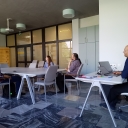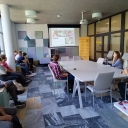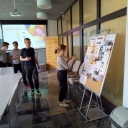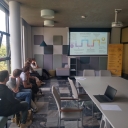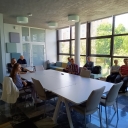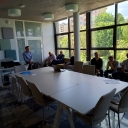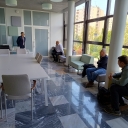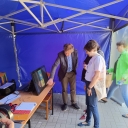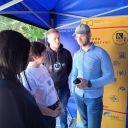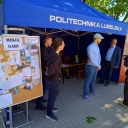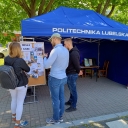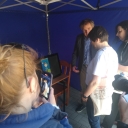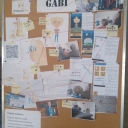On May 14-15, 2024, the 2nd Lublin Days of Integration (LDI) took place on the initiative of five Lublin universities: the Catholic University of Lublin. John Paul II, Lublin University of Technology, Maria Curie-Skłodowska University, Medical University and University of Life Sciences in Lublin. The aim of this event is, among others, transferring knowledge and at the same time raising awareness of issues related to accessibility and disability. This year, employees of the Department of Computer Science and graduates of Computer Science were involved in cooperation with the Rector’s Representative for Disabled Students from the Lublin University of Technology and the coordinator of the event at the University, Edyta Alinowska, MA, preparing three different workshops. The coordinator of the work on the part of the Department of Computer Science was Dr. Mariusz Dzieńkowski.
The first workshop entitled “Gabi and Miki – digital twins of children with type 1 diabetes (mobile application)” was carried out by an interdisciplinary team from the Department of Computer Science of the Lublin University of Technology and the Medical University (MU) in Lublin, consisting of: Prof. Dr. Marek Miłosz, Dr. Tomasz Nowicki, Piotr Wójcicki, Dr. Mariusz Dzieńkowski and Dr. Grzegorz Nowicki (MU). The aim of this workshop was to present the T1DCoach mobile application, which is a therapy simulator for a patient suffering from type 1 diabetes and using an insulin pump. This application allows for virtual therapy in the field of basic activities performed every day by the sick person or their caregiver. Possible activities include: measuring blood glucose using a glucometer or a continuous glucose monitoring system, composing a meal from ingredients, determining and administering meal boluses, insulin or carbohydrate corrections, and changing insulin pump settings. The greatest value of the application is the ability to observe the effects of actions taken that concern virtual patients – the titular Gabi and Miki, and not real people. This allows you to safely learn the consequences of everyday activities that a person with type 1 diabetes must perform and thus master the difficult art of conducting therapy. The application is addressed to all those who want to acquire or improve their knowledge in the field of type 1 diabetes treatment, both for adults and children. The application is also intended to teach regularity and responsibility for one’s actions. The workshops included a theoretical part and practical classes using a mobile application for Android.
The second workshop entitled: “Using proprietary software to build additive models for people with visual impairments” was prepared by Prof. Jerzy Montusiewicz, Dr. Sylwester Korga and Dr. Marcin Barszcz. The participants were introduced to the applications and possibilities of information technologies in various areas of life of people with vision problems. The meeting discussed how to create scripts for Blender that enable automation of the creation of graphic models. These models will be prepared for the additive manufacturing process, understood as 3D printing technology. The workshop leaders discussed the process of creating Braille tile models for blind people and presented their use in the field of museology.
The third workshop entitled “Application for speech rehabilitation for adults after brain damage” was prepared by IT graduates: Rafał Janik, Wojciech Lasota, Marek Sarnecki and the promoter of their engineering works, Dr. Mariusz Dzieńkowski. During this workshop, a speech therapy application for adults with brain damage was presented, which is intended to support patients and their families. This support is particularly important in the first months of the disease, which are crucial for the progress of rehabilitation by providing exercises previously used in traditional therapy, but thanks to the developed application also available in digital form. For people suffering from aphasia, readiness to exercise during the day is dynamic and depends on many factors, therefore a huge advantage of digital tools is their 24-hour availability, enabling the use of exercises at any time. The interface of the prepared application is based on the “mobile first” approach, which means that the main emphasis is placed on the ability to run each exercise on a mobile device. Traditional therapy covers several areas such as comprehension, expression, reading, writing and naming. Exercises have been developed for each of them, which you can easily run on your own smartphone. Creating an account by the user also allows you to personalize the therapy provided by the therapist. Workshop participants could log in to the application using their device and perform exercises, taking on the role of a person who had lost various language skills as a result of brain damage.
Workshops at the University, for organizational reasons, required prior registration. The first two of the above workshops were held on May 14 at the Support Center of the Lublin University of Technology at ul. Nadbystrzycka 38A at the Faculty of Electrical Engineering and Computer Science. Additionally. On the second day, May 15, a workshop on creating aid for people with vision problems was held at the Lublin University of Technology, and as part of the Integration Picnic organized by Maria Curie-Skłodowska Square at the Maria Curie-Skłodowska University, workshops were held again, this time in an open formula combined with the presentation of two mobile applications. The first one is addressed to young patients with type I diabetes, and the second presented application is used for speech therapy for adult patients after brain damage. The participants of the Picnic, open to all interested people, were shown videos showing the operation of both applications, and direct meetings with their authors were also an opportunity to independently operate the applications on a test smartphone. Moreover, thanks to the artistic talents of Anna Sałamachy, who prepared a board titled “Gabi’s Mission”, the Picnic participants could visually follow the entire process of creating an application developed for young people with diabetes, from the birth of the concept itself, through the design of the program and its initial implementation, to the testing stage and final implementation of the application.
This year’s 2nd Lublin Integration Days, thanks to the involvement of many people from the Lublin University of Technology and the Department of Computer Science, were an opportunity to exchange experiences and have free conversations on topics of interest to all event participants. They also gave the opportunity to ask questions to scientists from various universities in Lublin, including the Lublin University of Technology, who conduct research at the Department of Computer Science on a daily basis, including: with a view to eliminating barriers in the space around us and meeting the needs of people with disabilities. Workshops and open meetings show that scientific research conducted at the university also has practical applications outside its walls, and through their passion and work, scientists inspire first students, and then also young engineers, to use the knowledge acquired during their studies to change and improve the environment around us. reality.
Integration Days enjoyed great interest in the local media. Our presence was noted in articles, interviews and photos, which can be accessed via the following links:
- Polskie Radio Lublin – „Wspierają proces leczenia. Naukowcy z Politechniki Lubelskiej stworzyli wyjątkowe aplikacje”, https://radio.lublin.pl/2024/05/wspieraja-proces-leczenia-naukowcy-z-politechniki-lubelskiej-stwrzyli-wyjatkowe-aplikacje/
- Polskie Radio Lublin – „Piknik z okazji Lubelskich Dni Integracji”, https://radio.lublin.pl/2024/05/piknik-z-okazji-lubelskich-dni-integracji/
- TVP 3 Lublin – „II Lubelskie Dni Integracji”, https://lublin.tvp.pl/77525845/ii-lubelskie-dni-integracji
- pl – „II Lubelskie Dni Integracji. Piknik integracyjny na UMCS”, https://lublin24.pl/lista-galerii/9hPJxhFwIhK3j27h1Bdl#page33
- Dziennik Wschodni – Lubelskie Dni Integracji: Wsparcie, różnorodność i współpraca, https://www.dziennikwschodni.pl/lublin/lubelskie-dni-integracji,n,1000343111.html
- Kurier Lubelski – Aplikacje z Politechniki Lubelskiej pomogą młodym pacjentom z cukrzycą i dorosłym po uszkodzeniu mózgu. Można z nich korzystać za darmo, https://kurierlubelski.pl/aplikacje-z-politechniki-lubelskiej-pomoga-mlodym-pacjentom-z-cukrzyca-i-doroslym-po-uszkodzeniu-mozgu-mozna-z-nich-korzystac/ar/c14-18536977
- pl – Rehabilitacja bez wychodzenia z domu. Lubelscy naukowcy opracowali innowacyjne aplikacje, https://lublinews.pl/lublin/rehabilitacja-bez-wychodzenia-z-domu-lubelscy-naukowcy-opracowali-innowacyjne-aplikacje/
Mariusz Dzieńkowski
Marek Miłosz
